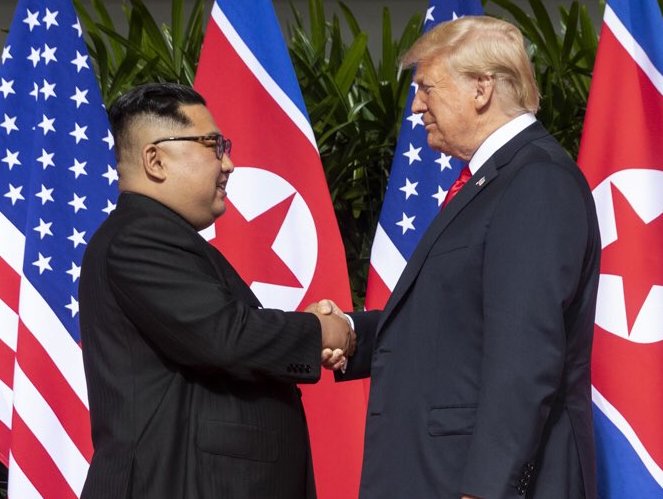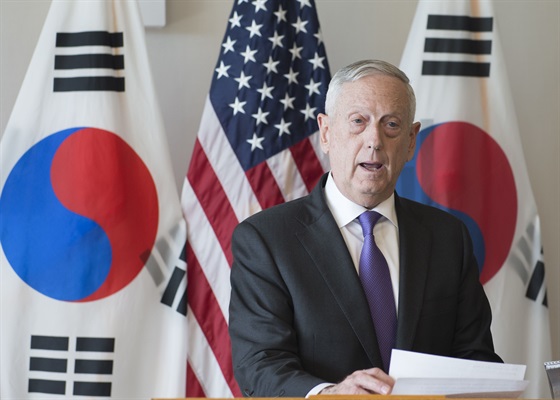Recommendations for North Korean Denuclearization Talks
While 2017 saw the “fire and fury” statements exchanged between the United States and North Korea, 2018 saw an improvement in relations. The June 2018 Singapore Summit was a welcome step in the right direction toward denuclearization, with U.S. President Donald Trump and Chairman Kim Jong Un of North Korea meeting in a historic first-ever meeting between leaders of the two countries. However, the lack of substance and formal commitments of the agreement that emerged from the summit worry policymakers that future talks could legitimize North Korea as a nuclear state.
Without substantive negotiations, U.S.-North Korea relations could easily return to the aggressive rhetoric that we saw in 2017 — and it could have a worse ending. For any talks that take place regarding denuclearization on the Korean peninsula, we recommend, taken from the Nuclear Crisis Group June 2017 report, the following to all parties: 1) Refrain from nuclear posturing; 2) Work toward no-first-use statements; 3) Focus on smaller, concrete achievements with the ultimate goal of complete denuclearization on the peninsula; and 4) Maintain communications and take steps to normalize relations.
- Refrain from nuclear threats and provocative military actions
To truly work toward denuclearization on the Korean peninsula, what is needed is even-handed leadership and diplomacy from all parties involved, not belligerent rhetoric. Any future denuclearization talks should continue the recent trend of moving away from nuclear posturing and military provocation between the United States and North Korea. Moving away from militaristic threats also means altering the U.S. military posture in Northeast Asia, including suspending flights by U.S. strategic bombers in return for proportional restraints by North Korea and assuming a more de-escalatory pose.
- Work toward the establishment of nuclear no-first-use statements.
The United States and allies working together with North Korea and South Korea to establish no-first-use statements would show the world that all parties involved are truly dedicated to denuclearization, as no first use would reduce the risk of the use of nuclear weapons whether by accident, miscalculation or intent. Specifically regarding the Korean peninsula, there is a strong incentive for all parties to establish no-first-use statements. A nuclear attack on North Korea would cause a major environmental and humanitarian catastrophe, with winds on the Korean peninsula blowing deadly radioactive fallout onto Japanese territory.
Short-term goals should include formally freezing North Korea’s nuclear program and reaching a verifiable agreement that will stop production of weapon-usable fissile material.

- Focus on small, tangible achievements that serve long-term interests, not on grand gestures.
The long-term goal of formal talks must be the complete denuclearization of the peninsula. However, many small steps will have to be taken to achieve this. Furthermore, the 2018 Singapore Summit put forth an agreement that lacked formal commitments and did not address long-term interests. Future talks must include frameworks that outline tangible, verifiable commitments.
Keeping in mind the complete denuclearization of the peninsula as the ultimate goal, short-term goals should include formally freezing North Korea’s nuclear program and reaching a verifiable agreement that will stop production of weapon-usable fissile material. Agreements that emerge from the Hanoi Summit or other future talks should also provide motivation for both sides to follow through on any commitments and forge a path forward for continuing serious dialogue.
- Maintain communications and take steps to normalize relations
Continuing dialogue on denuclearization means expanding and enhancing involvement in these discussions as well as taking steps to normalize relations amongst all parties and establishing a permanent peace regime. North Korea, South Korea, China, Japan, Russia, and the U.S. should reaffirm the 2005 Six-Party Talks joint statement on peace and stability in Northeast Asia, specifically on the Korean Peninsula. During those talks, all parties unanimously agreed their goal was the “verifiable denuclearization of the Korean Peninsula in a peaceful manner” and North Korea committed to abandoning their existing nuclear program.
